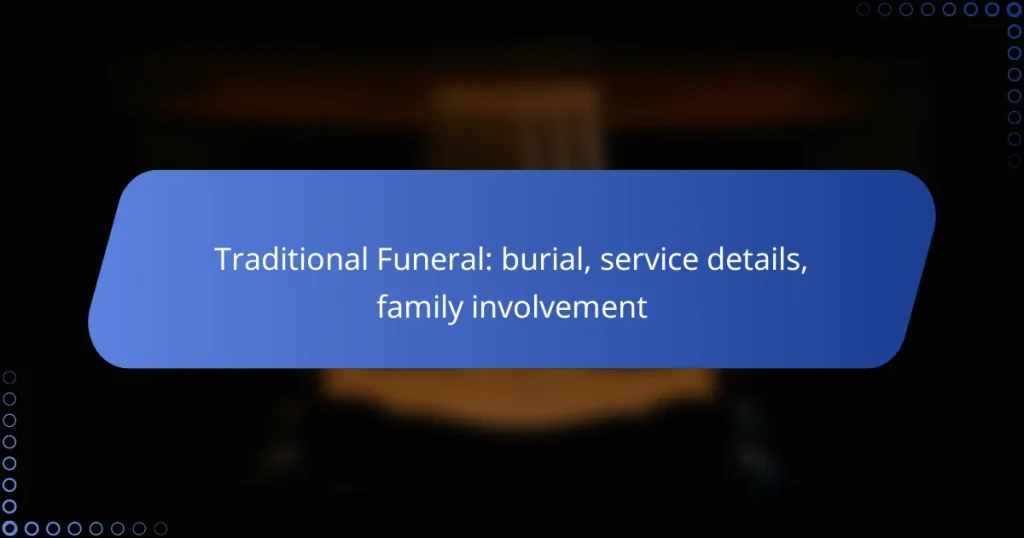Planning a traditional funeral involves several key elements, including burial options, service details, and family involvement. Families in Canada can choose from various burial methods, such as ground burial, cremation, or natural burial, each with distinct characteristics and regulations. A meaningful funeral service typically incorporates both personal and cultural elements, allowing families to create a tribute that reflects their loved one’s life. By actively participating in the planning process, families can ensure the service is a heartfelt expression of remembrance and support during their time of grief.

What are the traditional burial options in Canada?
In Canada, traditional burial options include ground burial, cremation, and natural burial. Each option has unique characteristics, costs, and regulations that families should consider when planning a funeral.
Ground burial
Ground burial is the most common traditional burial method in Canada, where the deceased is interred in a casket within a grave at a cemetery. Families typically choose a burial plot based on location, price, and cemetery regulations, which can vary significantly across provinces.
Costs for ground burial can range from a few thousand to over ten thousand Canadian dollars, depending on the cemetery, the type of casket, and additional services like grave markers. It’s essential to check local regulations regarding burial depths and plot ownership.
Cremation
Cremation involves the incineration of the body, resulting in ashes that can be kept in an urn, scattered, or buried. This option is increasingly popular in Canada due to its lower cost and flexibility in memorial services.
The price of cremation typically ranges from about one thousand to five thousand Canadian dollars, depending on the services chosen, such as memorial ceremonies or transportation. Families should consider their preferences for handling the ashes, as this can influence the overall experience.
Natural burial
Natural burial is an eco-friendly option where the body is buried without embalming, using biodegradable materials. This method emphasizes minimal environmental impact and is often conducted in designated natural burial grounds.
Costs for natural burial can vary but generally fall within a similar range as traditional ground burial. Families should research local natural burial sites, as they may have specific requirements and practices, such as the use of simple wooden caskets or shrouds.

What are the key components of a traditional funeral service?
A traditional funeral service typically includes several essential components such as the service location, the inclusion of religious or secular elements, and a specific order of service. Understanding these elements can help families plan a meaningful tribute that honors their loved one.
Service location
The service location is often a significant aspect of a traditional funeral. Common venues include funeral homes, places of worship, or even the deceased’s home. Choosing a location that reflects the personality and values of the deceased can enhance the experience for attendees.
When selecting a venue, consider factors such as capacity, accessibility, and any specific requirements for religious services. It’s advisable to visit potential locations to ensure they meet your family’s needs and preferences.
Religious or secular elements
Funerals can be either religious or secular, depending on the beliefs of the deceased and their family. Religious funerals often include prayers, hymns, and scripture readings, while secular services may focus on personal reflections and memories. The choice between these elements can significantly influence the tone of the service.
Families should discuss their preferences early in the planning process. Incorporating personal touches, such as favorite songs or readings, can make the service more meaningful, regardless of its religious or secular nature.
Order of service
The order of service outlines the sequence of events during the funeral. A typical structure may include an opening statement, readings, eulogies, and a closing prayer or song. This order helps guide attendees through the service and ensures that all important elements are covered.
Creating a printed program can help attendees follow along and understand the flow of the service. Be sure to communicate any special instructions or traditions that may be part of the order to ensure a respectful and smooth experience for everyone involved.

How can families participate in funeral planning?
Families can play a significant role in funeral planning by making decisions about the service details, selecting readings and music, and participating in rituals. Engaging in these aspects helps to create a personalized experience that honors the deceased and supports the grieving process.
Choosing the service type
When selecting the type of service, families can choose between traditional burial services, cremation, or memorial services. Each option has its own set of considerations, such as costs, location, and personal preferences. For example, a burial service may involve a graveside ceremony, while a memorial service can take place in various venues without the body present.
Families should discuss their wishes and budget, as traditional burial services can range from a few thousand to over ten thousand USD, depending on factors like casket choice and cemetery fees. It’s essential to compare different service providers to find the best fit for both emotional and financial needs.
Selecting readings and music
Choosing readings and music for the service allows families to reflect the personality and values of the deceased. Popular options include poetry, religious texts, or personal letters, which can evoke cherished memories. Music selections can range from classical pieces to contemporary songs that held significance for the deceased.
Families should consider the tone they want to set during the service. Uplifting music may be appropriate for a celebration of life, while more somber selections might suit a traditional funeral. Collaborating with a funeral director can help in curating a meaningful playlist and readings.
Involvement in rituals
Rituals play a crucial role in the grieving process, and families can participate in various ways, such as lighting candles, sharing memories, or performing cultural traditions. These actions can provide comfort and a sense of connection during a difficult time. Families should discuss which rituals resonate most with them and the deceased’s legacy.
Involving family members in these rituals can foster a supportive environment. For instance, having each family member share a personal story or memory can create a sense of unity and honor the deceased’s life. Planning these elements in advance can help ensure that everyone feels included and respected during the service.

What are the costs associated with traditional funerals in Canada?
The costs of traditional funerals in Canada can vary significantly based on location, services chosen, and personal preferences. Generally, families should expect to spend several thousand dollars, with total expenses often ranging from low tens of thousands to higher amounts depending on specific arrangements.
Average burial costs
Average burial costs in Canada typically range from CAD 5,000 to CAD 15,000. This includes the price of the burial plot, which can vary widely based on the cemetery’s location and reputation. Additional costs may include a headstone or marker, which can add several hundred to several thousand dollars to the total.
When planning for burial, consider factors such as ongoing maintenance fees for the grave site and any required permits. It’s advisable to compare prices from different cemeteries to find the best option that meets your family’s needs.
Service fees
Service fees for traditional funerals usually encompass costs related to the funeral home, including transportation of the body, preparation, and the use of facilities for the service. These fees can range from CAD 2,000 to CAD 10,000, depending on the services selected.
Families should inquire about itemized pricing to understand what is included in the service fees. Some funeral homes may offer package deals that can provide better value for comprehensive services.
Additional expenses
Additional expenses for traditional funerals may include flowers, obituary notices, and catering for post-service gatherings. These costs can add up quickly, often totaling several hundred to a few thousand dollars.
It’s essential to budget for these extras when planning a funeral. Consider discussing with family members to determine preferences and set a realistic budget that reflects the desired level of service and memorialization.

What legal requirements must be met for a funeral in Canada?
In Canada, several legal requirements must be fulfilled for a funeral, including obtaining a death certificate, securing burial permits, and adhering to funeral home regulations. These steps ensure that the process is conducted legally and respectfully, aligning with provincial laws and guidelines.
Death certificate
A death certificate is a crucial legal document that officially records the date, location, and cause of death. In Canada, it must be completed by a qualified medical professional and filed with the appropriate provincial or territorial vital statistics office.
Typically, the family or executor of the estate is responsible for obtaining the death certificate, which is necessary for various administrative tasks, such as settling the deceased’s estate and arranging the funeral. Processing times can vary, so it’s advisable to request this document promptly.
Burial permits
Burial permits are required to legally inter a body in Canada. These permits are issued by the local government or health authority and confirm that the burial complies with local regulations.
To obtain a burial permit, you generally need to present the death certificate and complete any necessary forms. It’s important to check with local authorities for specific requirements, as they can differ by province or municipality.
Funeral home regulations
Funeral homes in Canada must adhere to specific regulations that govern their operations. These regulations include licensing requirements, adherence to health and safety standards, and consumer protection laws.
When selecting a funeral home, ensure it is licensed and in good standing with local regulatory bodies. Families should also inquire about the services offered, pricing structures, and any additional fees to avoid unexpected costs during a difficult time.

What are the cultural considerations for funerals in Canada?
Cultural considerations for funerals in Canada vary widely due to the country’s diverse population. Factors such as religious beliefs, regional customs, and personal preferences play significant roles in shaping funeral practices.
Burial Practices
Burial practices in Canada can differ based on cultural backgrounds and religious affiliations. Many Canadians opt for traditional ground burials, while others may choose cremation, which has become increasingly popular. It’s essential to consider local regulations regarding burial sites and the environmental impact of different practices.
Families often select cemeteries that reflect their cultural or religious values. For instance, some may prefer a cemetery that offers specific rituals or memorial services aligned with their beliefs. Understanding these preferences can help families make informed decisions during a difficult time.
Service Details
Funeral services in Canada typically include a ceremony that honors the deceased, which may take place in a funeral home, church, or outdoor setting. The service often features readings, music, and eulogies that reflect the individual’s life and values. Personalization is key, and families are encouraged to incorporate elements that celebrate the deceased’s unique identity.
It is common for families to involve close friends and community members in the service, allowing for shared grief and support. Additionally, many Canadians choose to hold a wake or visitation prior to the funeral, providing an opportunity for attendees to pay their respects and share memories.
Family Involvement
Family involvement is crucial in the funeral planning process in Canada. Immediate family members often take the lead in making arrangements, which can include selecting the burial site, choosing the service details, and deciding on memorial items. Open communication among family members can help ensure that everyone’s wishes and feelings are considered.
In some cultures, extended family and community members play a significant role in the planning and execution of funeral rites. This collective approach fosters a sense of support and shared responsibility, which can be comforting during the grieving process. Families should be mindful of these dynamics and encourage participation from all who wish to contribute.


